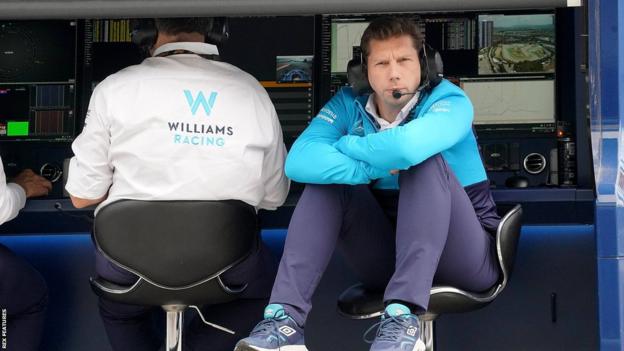
Williams team principal James Vowles says the increasing use of artificial intelligence in Formula 1 is “exciting for sure”.
However, Vowles believes that the human factor in the sport is still vital.
The 44-year-old is in his first season as Williams boss, having joined the team in January following more than a decade as the chief strategist for Mercedes.
“I think [AI] has a place,” he said. [We’re] not fearful, in fact quite the opposite,”
“That journey has just started, and I think there’s a lot more to come.”
The sheer amount of data generated by a modern Formula 1 car makes it inevitable, according to Vowles, that some form of AI now needs to be used to help analyse and interpret those readings.
Speaking at Williams’ headquarters in Grove, Oxfordshire, he told BBC Radio Norfolk: “One car is producing 70,000 channels of data, live, spat at you. But we’re looking at it in the same way that we did when I started in the sport 20-odd years ago.
“They come across the screen in squiggly lines, and you look at them for patterns. The difference is, it’s not 32 channels any more. There is no way, even with all the resources that we have, that you can consume them.
“A much better way of doing it is effectively to use machine learning, or data science methodologies, in order to compare to simulation and determine ‘actually, this is an outlier in this regard’, or ‘this is a pattern match for where we need to go’.”
Despite his enthusiasm for the potential of AI, Vowles denied that Formula 1 is all about “big data”.
He continued: “We’re going with prototype cars that are changing nearly race-on-race, to different tracks, with different tyres. So actually, the amount of commonality is quite small.
“But irrespective of that, if you know how to use that to your advantage, you can start finding patterns and trends that you’re looking for and how to make the car quicker.
“Clearly you can talk it out – and we do, to a certain extent. But actually the right way of doing that is to use modelling tools that will run millions of race scenarios. And then you find your pattern-matching through that over, statistically, what do you think your competitors will do, and what do you think you’ll do as a response to it?
“And then it gets to the interesting, what I call ‘game theory’, side of things. If you think all your competitors are going to go that way, do you do the complete inverse?”
When it comes to the managerial side of the operation, Vowles says human qualities, such as “emotional intelligence”, are still paramount.
“You have within this organisation 800 people – you have to form a connection [with each of them], because everyone has to point the right way. So that’s not about ‘intelligence’ as in IQ any more. That really is relationship-building.
“There’s a few ways of being a boss – you can scare people, or you can work with them, and I’m the second of the two. I try and be open, honest, ‘this is where we’re going and this is why we’re going in that direction’ – that’s what being a leader is.”
Vowles also believes that gaming has an important part to play in the sport’s future, especially when it comes to encouraging people who want a career in F1.
He added: “If you look at who’s really interested in the sport now, and how the sport is growing, it’s fantastic.
“Ten years ago, I’d almost have been worried about where the sport was going in terms of viewership and growth. Not today. We’re really getting into where we need to, which is making sure we’re attracting younger generations and women.
“What [F1’s two annual official video games] are allowing is people to see, ‘actually, this could be a potential career for me.’ If I wind back 35 years ago when I was watching it on TV, I didn’t realise that you could even have a job in Formula 1.”
